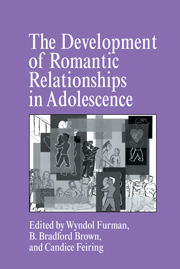Book contents
- Frontmatter
- Contents
- Contributors
- Foreword
- Acknowledgments
- 1 Missing the Love Boat: Why Researchers Have Shied Away from Adolescent Romance
- Part I Processes in Romantic Relationships
- Part II Individual Differences in Romantic Relationships
- Part III The Social Context of Romantic Relationships
- 10 Adolescent Romance and the Parent-Child Relationship: A Contextual Perspective
- 11 Romantic Relationships in Adolescence: The Role of Friends and Peers in Their Emergence and Development
- 12 “You're Going Out with Who?”: Peer Group Influences on Adolescent Romantic Relationships
- 13 The Cultured and Culturing Aspects of Romantic Experience in Adolescence
- 14 What's Love Got to Do with It? Adolescents' and Young Adults' Beliefs About Sexual and Romantic Relationships
- Part IV Conclusion
- Author Index
- Subject Index
14 - What's Love Got to Do with It? Adolescents' and Young Adults' Beliefs About Sexual and Romantic Relationships
Published online by Cambridge University Press: 05 October 2014
- Frontmatter
- Contents
- Contributors
- Foreword
- Acknowledgments
- 1 Missing the Love Boat: Why Researchers Have Shied Away from Adolescent Romance
- Part I Processes in Romantic Relationships
- Part II Individual Differences in Romantic Relationships
- Part III The Social Context of Romantic Relationships
- 10 Adolescent Romance and the Parent-Child Relationship: A Contextual Perspective
- 11 Romantic Relationships in Adolescence: The Role of Friends and Peers in Their Emergence and Development
- 12 “You're Going Out with Who?”: Peer Group Influences on Adolescent Romantic Relationships
- 13 The Cultured and Culturing Aspects of Romantic Experience in Adolescence
- 14 What's Love Got to Do with It? Adolescents' and Young Adults' Beliefs About Sexual and Romantic Relationships
- Part IV Conclusion
- Author Index
- Subject Index
Summary
Over the past 30 to 40 years, dramatic changes have taken place in our society in adolescents' and young adults' entry into sexuality, marriage, and parenting. The links between sexual activity and marriage began to erode with increased options for contraception, changes in societal norms, and opening up of economic opportunities for women (Alan Guttmacher Institute [AGI], 1994; Furstenberg, 1995, in press; Smith, 1994). Subsequent eroding of the link between the establishment of a stable marriage as a necessary condition of parenting has occurred due to myriad social policies and societal norms on divorce and the support of children (Cherlin, 1988; Furstenberg, 1995). Adolescent and young adult transitions to sexuality, marriage, and childbearing occur in parallel with, although not necessarily as a result of, the development of romantic relationships.
In our culture, a prevailing belief is that sexual intimacy is inappropriate if it does not occur in the context of love, and often a legally or religiously sanctioned arrangement (i.e., marriage). However, the strength of this belief varies across historical periods; the dimension of the relationship; and the gender, age, and context of the individuals involved. The timing and co-occurrence or patterning of sex, love, and stable, long-term relationships occur in societal and historical contexts (Elder, 1974, 1985; Hagestad, 1986; Hardy, Astone, Brooks-Gunn, Shapiro, & Miller, 1998; Hareven, 1977).
- Type
- Chapter
- Information
- The Development of Romantic Relationships in Adolescence , pp. 364 - 396Publisher: Cambridge University PressPrint publication year: 1999
- 15
- Cited by

